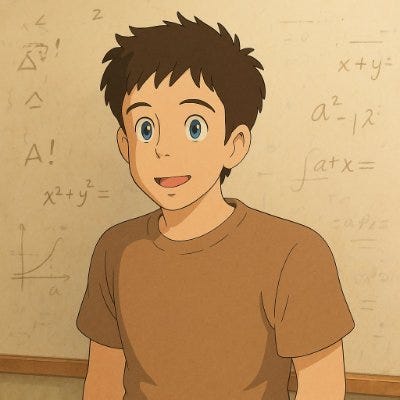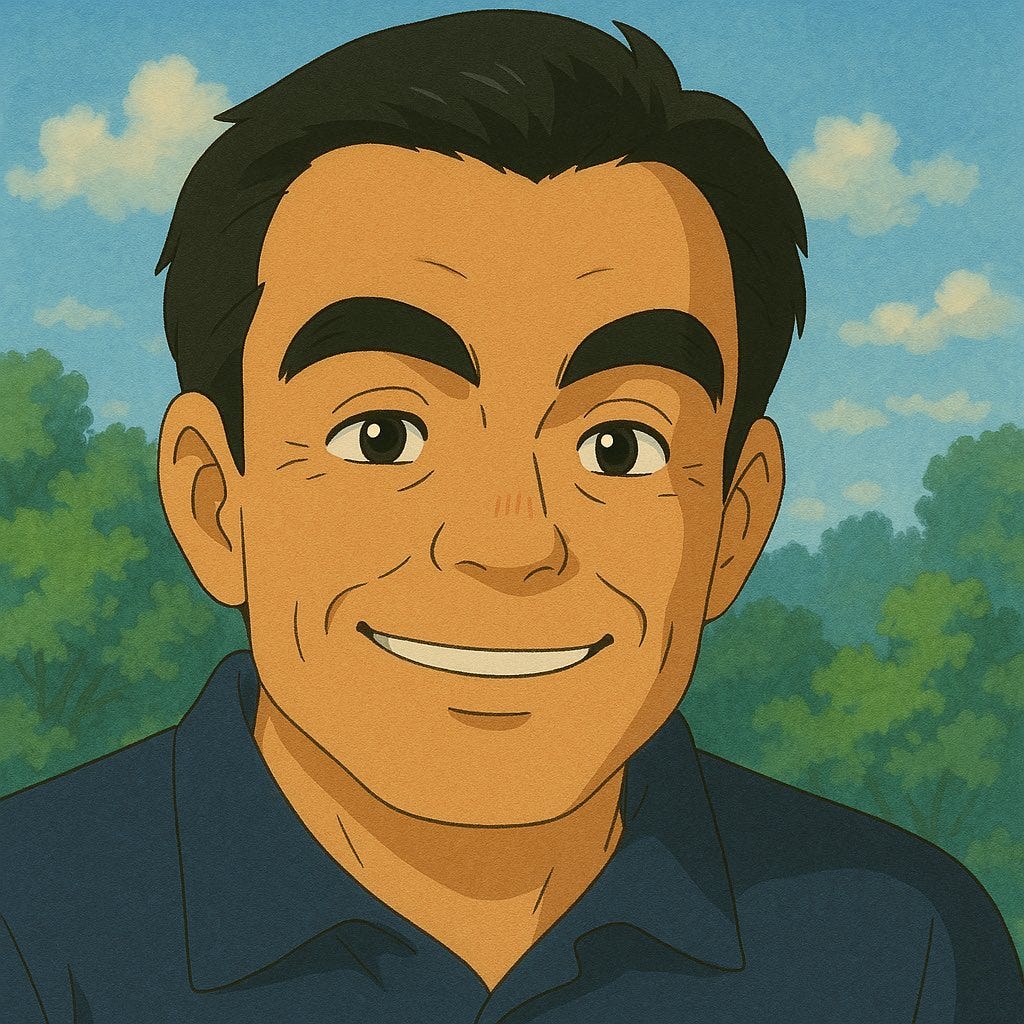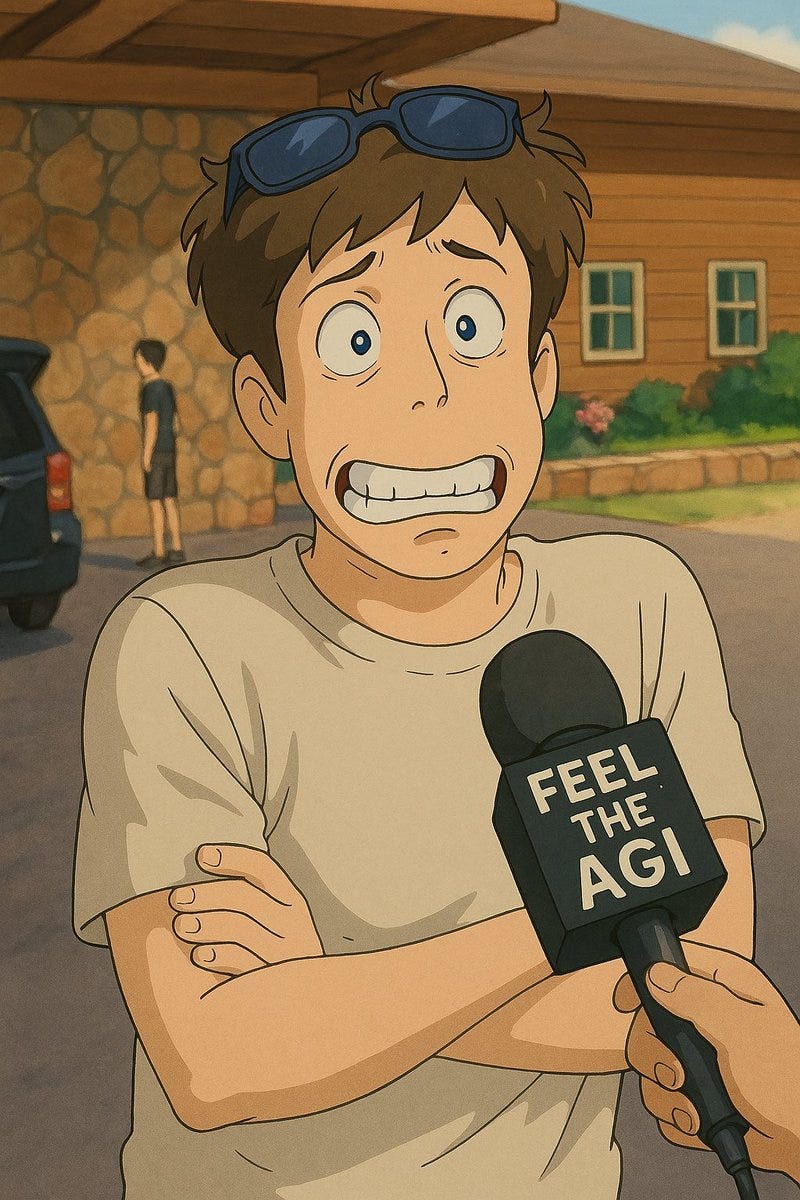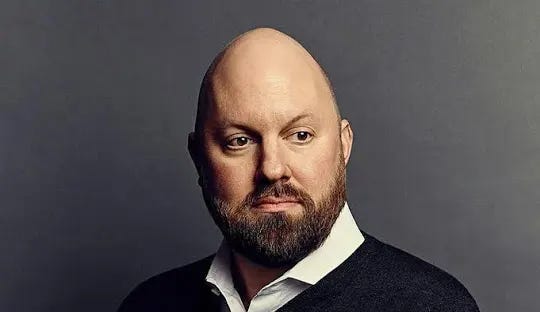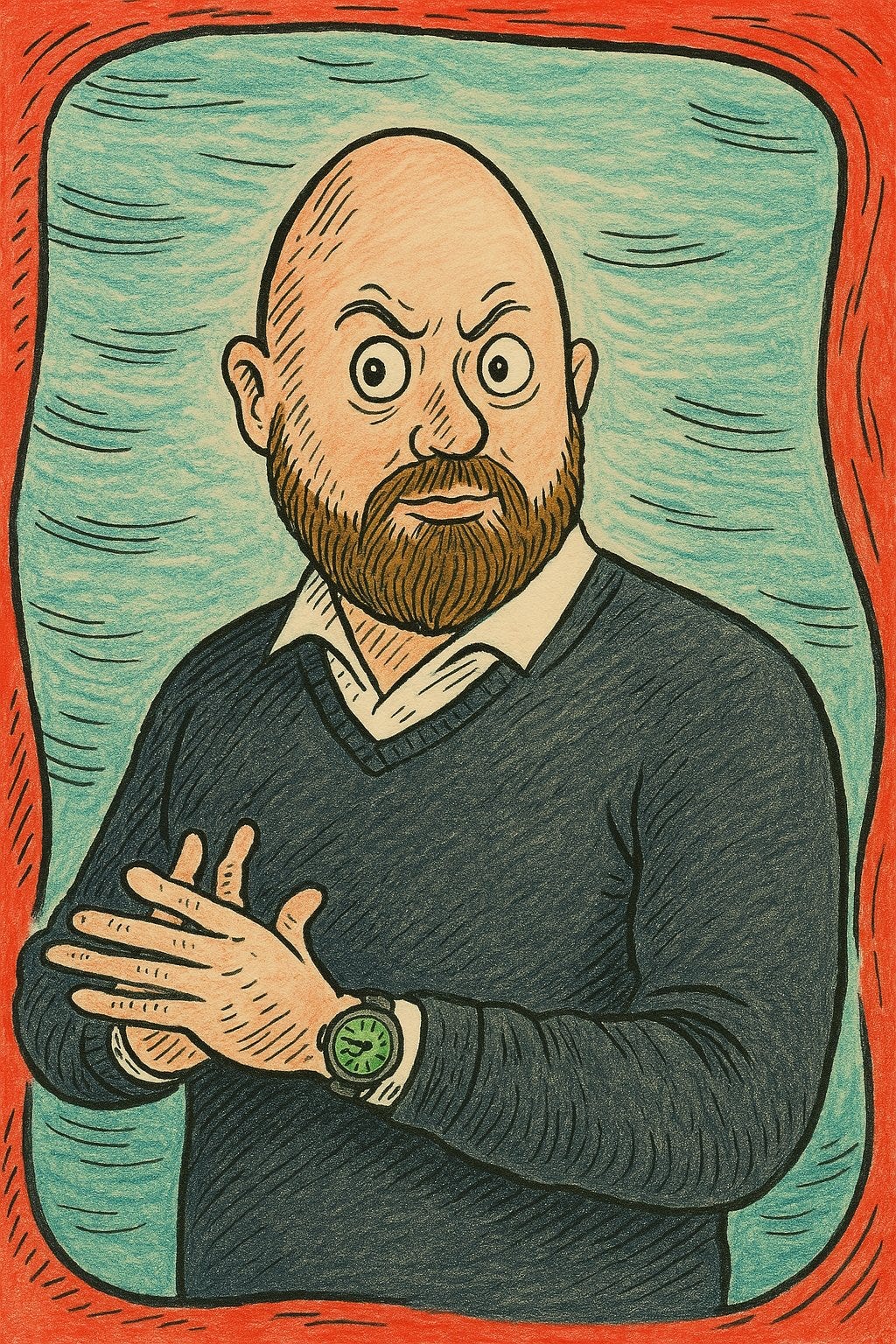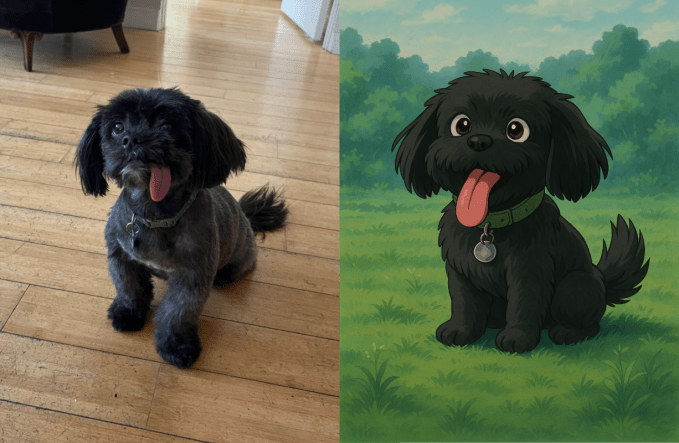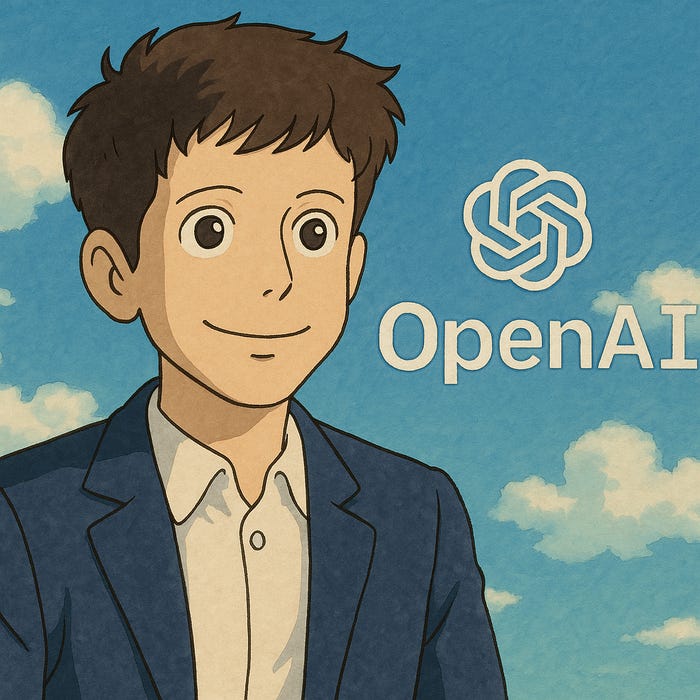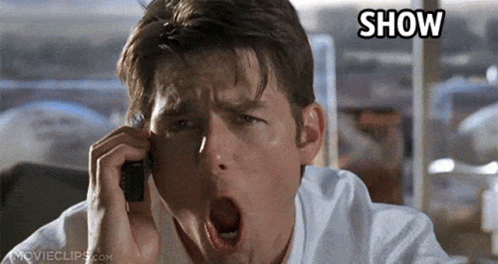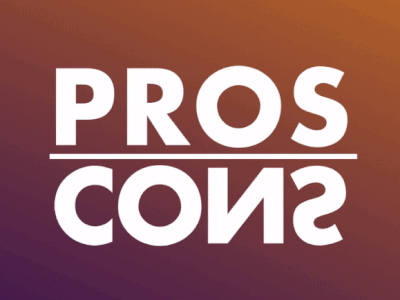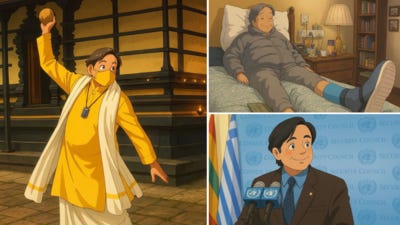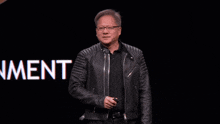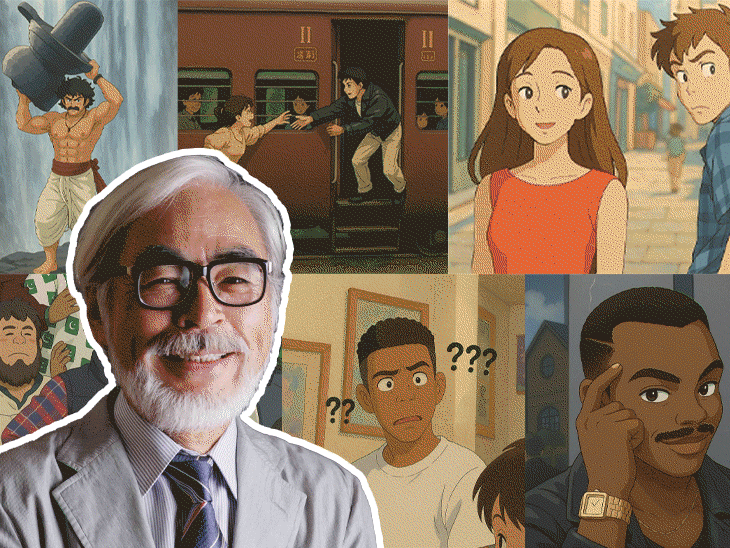
AI: Studying OpenAI's Global 'Studio Ghibli' AI Images success. RTZ #674
The Bigger Picture, Sunday, March 26, 2025
OpenAI saw a global release of its latest LLM AI based text to image generation feature for GPT-4o via its 500 million plus ChatGPT users, due in part to its ability to mimic the Studio ‘Ghibli’ style of famed Japanese film-maker Hayao Miyazaki (see above).
It was rolled out proudly by founder/CEO Sam Altman and team. He even turned his X/Twitter images accordingly:
And you’ve likely already seen images like those below in your social media feeds, turning your friends and families into ‘Ghibli style’ characters.
Here’s yours truly, converted by ChatGPT from this as my social media image on X/Twitter
to this below:
And its global meme driven use by celebrities and mainstream folks has stirred up both admiring fans, and of course concerns of copyright infringement. That is a Bigger Picture issue worth discussing at the dawn of these cool AI capabilities in this AI Tech Wave. Sam and team are now certainly ‘feeling the AGI’, Ghibli style.
First of all, it is a notable technical advance in LLM imaging, done via generative Ai rather than Diffusion techniques used by OpenAI’s Dall-E software not so long ago. As Techcrunch describes it all in “ChatGPT’s image-generation feature gets an upgrade”:
“During a livestream on Tuesday, OpenAI CEO Sam Altman announced the first major upgrade to ChatGPT’s image-generation capabilities in over a year.”
“ChatGPT can now leverage the company’s GPT-4o model to natively create and modify images and photos. GPT-4o has long underpinned the AI-powered chatbot platform, but until now, the model has been able to generate and edit only text — not images.”
Who knows, VCs may like this AI text to image trend as well.
“Altman said GPT-4o native image generation is live today in ChatGPT and Sora, OpenAI’s AI video-generation product, for subscribers to the company’s $200-a-month Pro plan. OpenAI says the feature is rolling out soon to Plus and free users of ChatGPT, as well as developers using the company’s API service.”
“GPT-4o with image output “thinks” a bit longer than the image-generation model it effectively replaces, DALL-E 3, to make what OpenAI describes as more accurate and detailed images. GPT-4o can edit existing images, including images with people in them — transforming them or “inpainting” details like foreground and background objects.”
“To power the new image feature, OpenAI told the Wall Street Journal it trained GPT-4o on “publicly available data,” as well as proprietary data from its partnerships with companies like Shutterstock.”
And people are having fun converting their favorite loved ones into Ghiblified versions:
And this has of course raised copyright concerns, as Techcrunch notes in a separate piece:
“It’s only been a day since ChatGPT’s new AI image generator went live, and social media feeds are already flooded with AI-generated memes in the style of Studio Ghibli, the cult-favorite Japanese animation studio behind blockbuster films such as “My Neighbor Totoro” and “Spirited Away.”
“In the last 24 hours, we’ve seen AI-generated images representing Studio Ghibli versions of Elon Musk, “The Lord of the Rings“, and President Donald Trump. OpenAI CEO Sam Altman even seems to have made his new profile picture a Studio Ghibli-style image, presumably made with GPT-4o’s native image generator. Users seem to be uploading existing images and pictures into ChatGPT and asking the chatbot to re-create it in new styles.”
Other LLM AI companies have also offered similar capabilities:
“OpenAI’s latest update comes on the heels of Google’s release of a similar AI image feature in its Gemini Flash model, which also sparked a viral moment earlier in March when people used it to remove watermarks from images.”
“OpenAI’s and Google’s latest tools make it easier than ever to re-create the styles of copyrighted works — simply by typing a text prompt. But the real concern lies in how these AI tools are trained to imitate styles. Are these companies training on copyrighted works, and if so, does that violate copyright law?”
And so, cue up the lawsuits on copyright concerns, ‘Fair Use’ and all:
“That’s the question at the core of several ongoing lawsuits against generative AI model developers.”
“According to Evan Brown, an intellectual property lawyer at the law firm Neal & McDevitt, products like GPT-4o’s native image generator operate in a legal gray area today. Style is not explicitly protected by copyright, according to Brown, meaning OpenAI does not appear to be breaking the law simply by generating images that look like Studio Ghibli movies.”
BUT…
“Brown says it’s plausible that OpenAI achieved this likeness by training its model on millions of frames from Ghibli’s films. Even if that was the case, several courts are still deciding whether training AI models on copyrighted works falls under fair use protections.”
“I think this raises the same question that we’ve been asking ourselves for a couple years now,” said Brown in an interview. “What are the copyright infringement implications of going out, crawling the web, and copying into these databases?”
“The New York Times and several publishers are in active lawsuits against OpenAI, claiming the company trained its AI models on copyrighted works without proper attribution or payment. There have been similar claims brought in lawsuits against other leading AI companies, including Meta and AI image-generation startup Midjourney.”
OpenAI has its views on what it’s latest tech can do:
”In a statement to TechCrunch, an OpenAI spokesperson says that while ChatGPT refuses to replicate “the style of individual living artists,” OpenAI does permit it to replicate “broader studio styles.” Of course, it’s worth noting there are living artists who are credited with pioneering their studio’s unique styles, such as Studio Ghibli’s co-founder, Hayao Miyazaki.”
“Evidently, users have also been able to use GPT-4o’s native image-generation feature to re-create styles from other studios and artists. Someone else made a Marc Andreessen portrait in the style of Dr. Seuss, and a married couple re-created their wedding photos in the style of Pixar.”
What’s notable about the Ghibli mainstream meme trend is not the raising of copyright questions, which have been going on for a while now.
What’s noteable here is this trend is fairly mainstream globally now, and people around the world are learning how to spell ‘Ghibli’ and learning what it is in the first place.
Here’s Indian politician Shashi Tharoor showing off his Ghibli images with relative glee:
Which ultimately should be a long-term benefit to Mr. Miyazaki and the Studio Ghibli team in terms of the popularity of their IP.
Much as others have discovered in terms of the pros and cons of internet ‘emulation’ and ‘popularization’ of copyrighted content.
The Ghibli meme movement is the fist time users are seeing the mainstream appeal and application of text to image AI software.
And that alone is worth noting as a Bigger Picture at this point in this AI Tech WaveRegardless of what happens on the copyright front. Stay tuned.
(NOTE: The discussions here are for information purposes only, and not meant as investment advice at any time. Thanks for joining us here)

